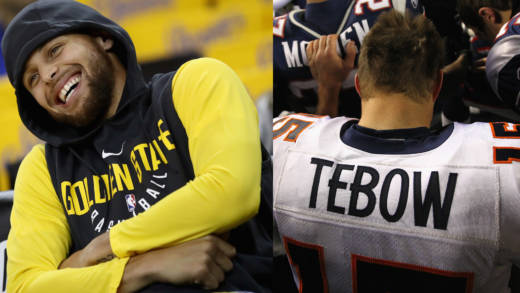So why is Curry almost universally beloved, celebrated and compensated for his religious beliefs while Tebow was so polarizing?
I put that question to Americus Reed, a professor of marketing at the University of Pennsylvania's Wharton School. Here are a few highlights from our conversation.
On why being a religious athlete worked for Curry but not Tebow:
Reed: I think that what is going on here is a little bit of what we term in marketing as "differentiation." So if you're used to seeing something and it's not new, then it might actually annoy you. So a young, white, male athlete with religious identity composed in their brand is something you might actually expect. So because it's not standing out as anything different, it might sort of hit that annoyance meter.
But for a young man like Steph Curry who is an African-American athlete -- and you can think about how African-American athletes are portrayed in the media and certainly portrayed in terms of their sports identities -- then you can see that taking a religious sort of bent in terms of what Steph Curry is doing is actually quite different and perhaps unexpected. Certainly I can't name any other African-American superstar NBA athletes who are doing that. So it kind of stands out.
On the different focus of Curry's and Tebow's religious brands:
Reed: He is building in religious identity with a lowercase r. What that means is he's being very careful about not pressing his views on the people in terms of marriage, definitions of marriage and things like that.
Tim Tebow was very prominent with this idea of "I'm a virgin," which implies that premarital sex is bad and implies all of these religious moral rules that might turn some people off. I think that what Steph is doing is he's walking that fine line. He's wrapping up religiosity in the context of family and values that are associated with that as opposed to strict religious identity rules that might be particularly tied to his faith.
He doesn't really get into issues of what is the right definition of family and things like that even though he might hold these views, but he's smart enough to know that I don't want to bring that into my brand because that is starting to step over the line with respect to potentially alienating lots of different types of consumers.
On how Curry makes us think we're just like him:
Reed: This religiosity, this family identity brand is nicely connected to his "everyday guy" mentality. You look at, for example, LeBron James. He's a good guy too, and he believes in family too right? He probably believes in religious identity as well just as much as Steph perhaps. But he has this kind of different brand. He's kind of this freak of nature, right? You know you can't be LeBron.
But you look at Steph Curry, and you're like, I might be able to be that guy if you are just Jane or John Doe on the street. You actually have that connection like, "Wow, I could be like him." So that pulls you in.

